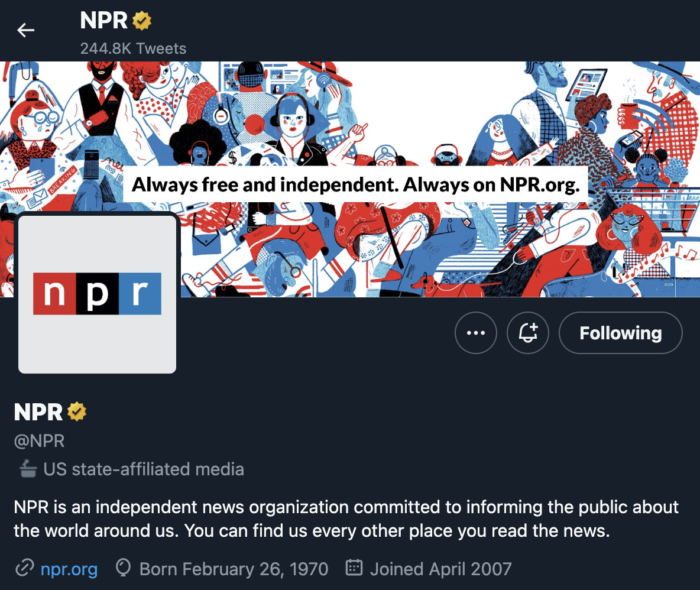
Looking for NPR stories on Twitter? Look elsewhere.
NPR has not tweeted since Twitter slapped a “US state-affiliated media” label on its main account on Wednesday, a designation that lumps the news org in with propaganda outlets like Russian broadcaster RT and China’s People’s Daily newspaper. And it doesn’t plan to until the label is removed.
The @NPR account — which has more than 8.8 million followers — has an updated bio: “You can find us every other place you read the news.” The header image now includes the words: “Always free and independent. Always at NPR.org.”

The changes were made on Thursday, NPR spokesperson Isabel Lara confirmed.
“We stopped tweeting from the main @NPR account after they attached that false label to it because each tweet we publish would carry it,” Lara said. “We have paused tweeting from that account until we hear back from Twitter on this. We’ve continued tweeting from other accounts that aren’t mislabeled.”
Abstaining from Twitter is less of a hardship than Twitter owner Elon Musk might like to think. Twitter doesn’t drive much traffic for most news publishers, even though it’s a platform many journalists can’t seem to quit. (And that’s before the “state-affiliated” label downranks your content.)Also on Thursday, Musk told an NPR reporter that the designation may have been a mistake.
“Well, then we should fix it,” Musk wrote in an email to tech reporter Bobby Allyn, who had pointed out government aid accounts for roughly 1% of NPR’s finances.
Allyn said he “provided Musk publicly available documentation of the network’s finances showing that nearly 40% of its funding comes from corporate sponsorships and 31% from fees for programming paid by local public radio stations.”
Twitter defines “state-affiliated” publishers as ones where the government “exercises control over editorial content through financial resources, direct or indirect political pressures, and/or control over production and distribution.”Until Wednesday, Twitter’s own policy on the “state-affiliated” label specifically noted that “state-financed media organizations with editorial independence, like the BBC in the UK or NPR in the United States, are not defined as state-affiliated media for the purposes of this policy.” Twitter removed the reference to NPR after giving its account the “state-affiliated” label.